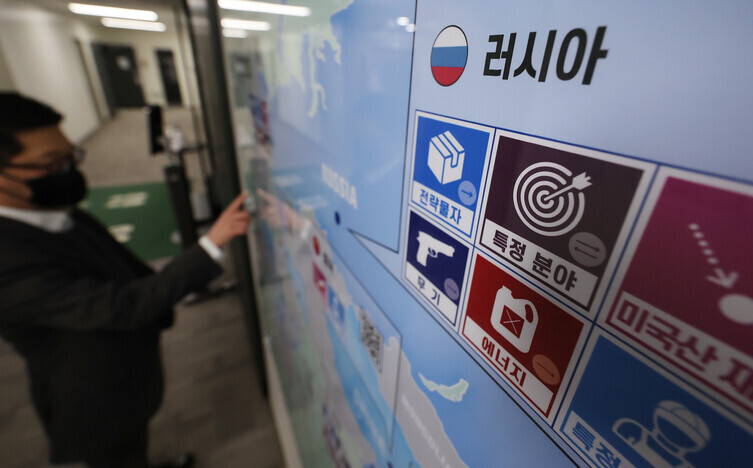hankyoreh
Links to other country sites 다른 나라 사이트 링크
Russia lists S. Korea among “unfriendly” states, causing headaches for Korean companies

Russia included South Korea in its list of “unfriendly” countries in connection with the war in Ukraine.
According to Reuters and other news sources, Russia announced Monday that government approval would be required for all transactions with companies and individuals in “unfriendly countries.” Accordingly, the Russian government approved a list of countries that had adopted “unfriendly measures” against Russia, the reports said.
The list of unfriendly countries announced by Moscow includes Canada, the members of the European Union, Japan, Norway, Singapore, South Korea, Switzerland, Ukraine, the UK and the US.
The measures come on the heels of a March 5 presidential decree on limited-time procedures for repayment obligations to overseas creditors. This decree temporarily allows Russian companies and individuals to use rubles to repay foreign-denominated liabilities to creditors in unfriendly countries.
Coming in response to the freezing of foreign exchange reserves and the plunging value of the ruble amid Western economic sanctions, the measures are a blow to South Korean companies and individuals who must now accept devalued rubles for liabilities to be paid by Russia.
Russian debtors must establish a special ruble-denominated account at a Russian bank to make liability payments to credits in rubles according to the exchange rate announced by the Russian government. The measures apply for the replaying of liabilities in excess of 10 million rubles per month, or roughly 88.5 million won by the current exchange rate.
By Jung E-gil, senior staff writer
Please direct questions or comments to [english@hani.co.kr]

Editorial・opinion
![[Column] Park Geun-hye déjà vu in Yoon Suk-yeol [Column] Park Geun-hye déjà vu in Yoon Suk-yeol](https://flexible.img.hani.co.kr/flexible/normal/500/300/imgdb/original/2024/0424/651713945113788.jpg) [Column] Park Geun-hye déjà vu in Yoon Suk-yeol
[Column] Park Geun-hye déjà vu in Yoon Suk-yeol![[Editorial] New weight of N. Korea’s nuclear threats makes dialogue all the more urgent [Editorial] New weight of N. Korea’s nuclear threats makes dialogue all the more urgent](https://flexible.img.hani.co.kr/flexible/normal/500/300/imgdb/original/2024/0424/7317139454662664.jpg) [Editorial] New weight of N. Korea’s nuclear threats makes dialogue all the more urgent
[Editorial] New weight of N. Korea’s nuclear threats makes dialogue all the more urgent- [Guest essay] The real reason Korea’s new right wants to dub Rhee a founding father
- [Column] ‘Choson’: Is it time we start referring to N. Korea in its own terms?
- [Editorial] Japan’s rewriting of history with Korea has gone too far
- [Column] The president’s questionable capacity for dialogue
- [Column] Are chaebol firms just pizza pies for families to divvy up as they please?
- [Column] Has Korea, too, crossed the Rubicon on China?
- [Correspondent’s column] In Japan’s alliance with US, echoes of its past alliances with UK
- [Editorial] Does Yoon think the Korean public is wrong?
Most viewed articles
- 1[Column] Park Geun-hye déjà vu in Yoon Suk-yeol
- 2[Guest essay] The real reason Korea’s new right wants to dub Rhee a founding father
- 3Why Korea shouldn’t welcome Japan’s newly beefed up defense cooperation with US
- 4[Column] ‘Choson’: Is it time we start referring to N. Korea in its own terms?
- 5Will NewJeans end up collateral damage in internal feud at K-pop juggernaut Hybe?
- 6Senior doctors cut hours, prepare to resign as government refuses to scrap medical reform plan
- 7New AI-based translation tools make their way into everyday life in Korea
- 8Thursday to mark start of resignations by senior doctors amid standoff with government
- 9N. Korean hackers breached 10 defense contractors in South for months, police say
- 10Kim Jong-un expressed ‘satisfaction’ with nuclear counterstrike drill directed at South